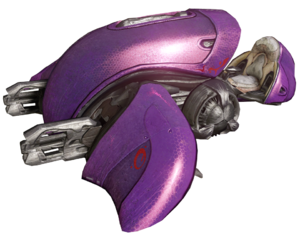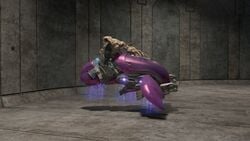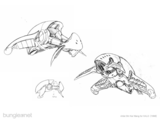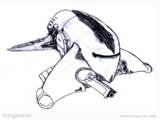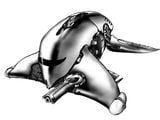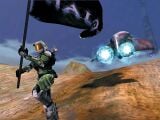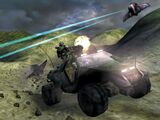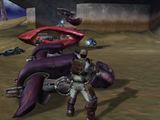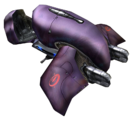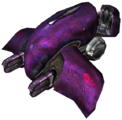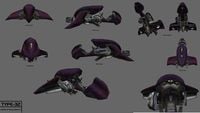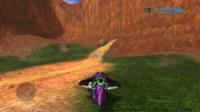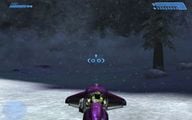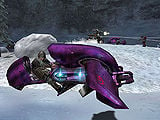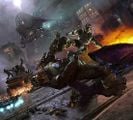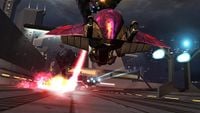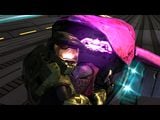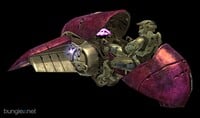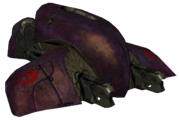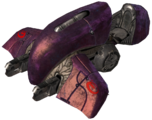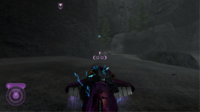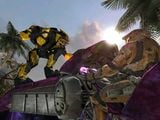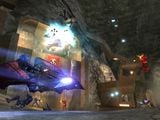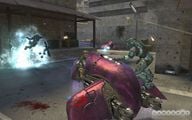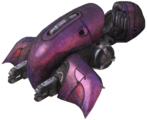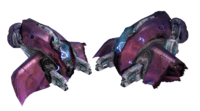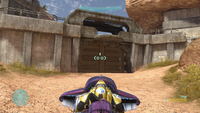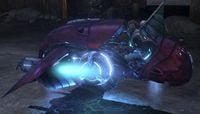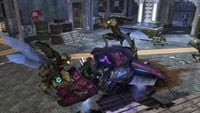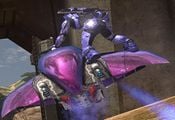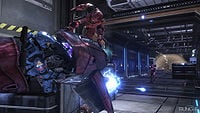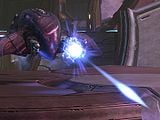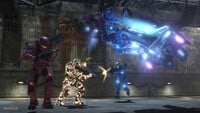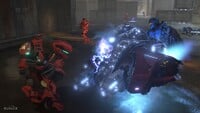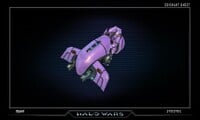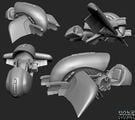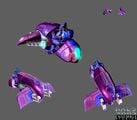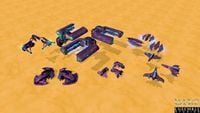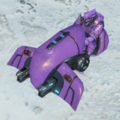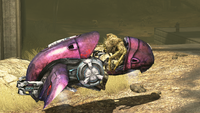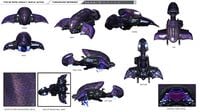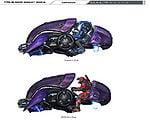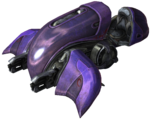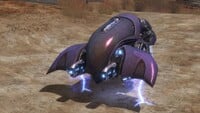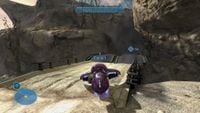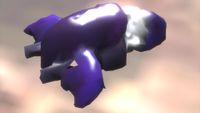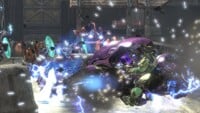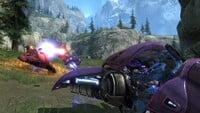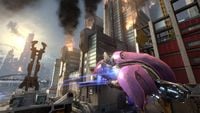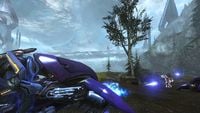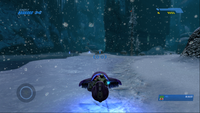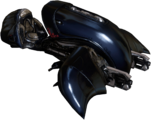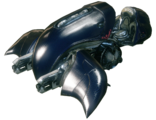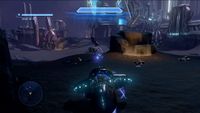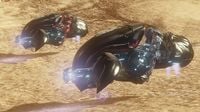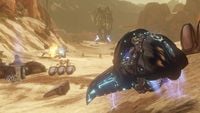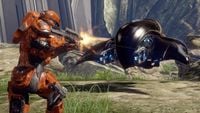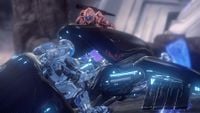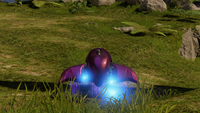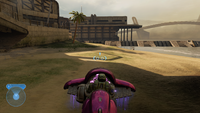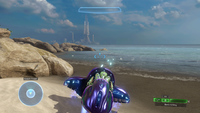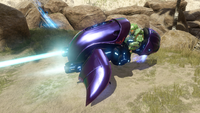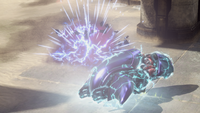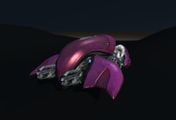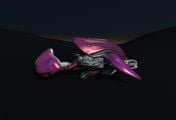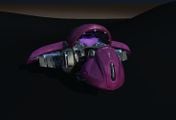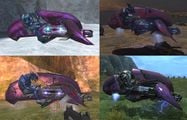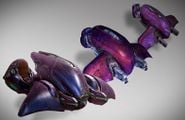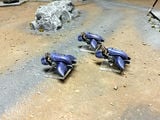Karo'etba-pattern Ghost: Difference between revisions
From Halopedia, the Halo wiki
| Line 1: | Line 1: | ||
{{Title|''Karo'etba''-pattern Ghost}} | |||
{{ | {{Status|Canon}} | ||
{{ | {{Center|This article is about the Covenant vehicle. For the post-war Ghost model, see {{Pattern|Karo'wark|Ghost}}. For other uses, see [[Ghost (disambiguation)]].}} | ||
{{ | {{Vehicle infobox | ||
|image=[[ | |name=''Karo'etba''-pattern Scout Bike | ||
|name= | |image=[[File:H2A T32Ghost.png|300px|right]] | ||
|manufacturer=*[[Iruiru Armory]]<ref name="visual">'''[[Halo: The Essential Visual Guide]]''', ''page 79''</ref> | |||
|line= | *[[Lodam Armory]]<ref>[http://halo.xbox.com/halo4#!an-epic-universe/ordnance-armor/cbbca9b3-5108-41aa-aa21-9b523de68266 '''Halo 4 Official Site''': ''Ordnance + Armor'']</ref> | ||
|model= | |line=[[Ghost]] | ||
| | |model=''Karo'etba''-pattern | ||
|length=4.2 | |cost= | ||
|width= | |length={{Convert|4.2|m|ft|sp=us}}<ref name="ENC">'''[[Halo Encyclopedia (2009 edition)]]''' - ''Locations, page 245''</ref> | ||
|height= | |width={{Convert|3.9|m|ft}}{{Ref/Reuse|visual}} | ||
|mass= | |height={{Convert|1.8|m|ft}}{{Ref/Reuse|visual}} | ||
| | |mass={{Convert|559.1|kg|lb}}<ref name="universe">[https://www.halowaypoint.com/en-us/universe/vehicles/ghost '''Halo Waypoint''': ''Ghost'']</ref> | ||
|max speed=132 km/h (82 mph){{Ref/Reuse|universe}} | |||
|max speed | |engine=[[Boosted gravity propulsion drive]]<ref name="man">'''[[Halo 2: Special Collector's Edition Manual]]''', ''page 16''</ref> | ||
| | |hull=[[Nanolaminate hull plating]] | ||
|engine=Boosted | |armament=Two [[Class-2 directed energy cannon]]s{{Ref/Reuse|man}} | ||
| | <br>[[Fuel rod cannon]] | ||
|crew=One driver | |||
| | |||
| | |||
| | |||
|complement= | |complement= | ||
|consumables= | |consumables= | ||
|othersystems= | |othersystems= | ||
|firstuse= | |firstuse-title=In service | ||
| | |firstuse=[[Human-Covenant War]]<br>[[Great Schism]]<br>[[Blooding Years]]<br>[[Post-Covenant War conflicts]] | ||
|role=Infantry support, reconnaissance | |||
| | |affiliation=[[Covenant]]<br>[[Banished]]<br>[[Swords of Sanghelios]]<br>[[Servants of Abiding Truth]]<br>[[Merg Vol's Covenant]]<br>[[Jul 'Mdama's Covenant]]<br>[[Sali 'Nyon's Covenant]] | ||
|affiliation=Covenant | |||
}} | }} | ||
== | The '''''Karo'etba''-pattern Scout Bike'''{{Ref/Book|Id=Enc22|Enc22|Page=272}} {{Type|32|Rapid Attack Vehicle|RAV}},{{Ref/Reuse|visual}} more commonly identified as the '''Ghost''' by the [[United Nations Space Command|UNSC]], is the [[Covenant]]'s standard reconnaissance and rapid attack vehicle. | ||
==Overview== | |||
===Design details=== | |||
[[File:Ghost.jpg|thumb|left|150px|Ghost blueprint.]] | |||
The Ghost is a one-man [[anti-gravity technology|gravity-effect]] vehicle, primarily used in a reconnaissance and close infantry support or rapid attack role.<ref name="bung">[http://halo.bungie.net/projects/reach/article.aspx?ucc=ordnance&cid=25443 '''T32 RAV Bungie.net Ordnance Guide''']</ref> Known for its speed and maneuverability as well as its near silent anti-gravity propulsion system the Type-32's use in the field by the Covenant is varied but can adjust very quickly and easily for any role required at any moment.{{Ref/Reuse|ENC}} From a design standpoint the Type-32's design is a sleek winged vehicle design more akin to an insect or an aircraft than a ground vehicle. The Ghost is composed of two major components, the fuselage, which contains the Type-32's hardware including its energy weapon system, its anti-gravity propulsion system, imaging, control and guidance systems and fuel as well as its two stabilizing fins. The second part of the vehicle is the seating and guidance section, this multi-joint piece of the vehicle is connected to the pilot's seat and is connected to the fuselage by a ball joint, this aids the pilot in controlling, as the vehicle is controlled as much by weight distribution as it is by steering by use of two joysticks.{{Ref/Reuse|ENC}} The pilot is seated in front of a large holographic display console, this console displays the status of the vehicle and controls. Because the Ghost lacks any type of actual viewing window, the largest display on the display console is the video display screen, which shows a wide angle view of what is in front of the vehicle as well as display a targeting heads-up-display. The [[Office of Naval Intelligence]] believes that the exposed cockpit was an intentional design by the [[Sangheili]] in an effort to display their fearlessness.{{Ref/Reuse|universe}} | |||
The Type-32 RAV is used by the Covenant for a number of different roles, such as patrolling large areas in short amount of time, and to combat infantry when needed. The Ghost can be deployed almost anywhere and can follow Covenant ground troops with ease. The Ghost is propelled by a form of anti-gravity engine known as a [[boosted gravity propulsion drive]],{{Ref/Reuse|man}} allowing the Ghost to skim above the ground while it is activated. This drive is visible as a bright, fluorescent area of blue energy emanating from the underside of the Ghost. This form of propulsion can accelerate the vehicle very rapidly, reaching speeds of up to 60 kilometers per hour, and up to 90 kilometers per hour when using the boost. By running on its power source and fuel, the Ghost can travel a distance of approximately 950 km or 590 miles,{{Ref/Reuse|ENC}} before needing to be refueled. Ghosts have been the vehicle of choice for the Sangheili, though [[Unggoy]] can also be seen piloting Ghosts on occasion. [[Jiralhanae]], meanwhile, do not use the vehicle as much, preferring to rely on their own vehicle the [[Barukaza Workshop Chopper|Type-25 RAV]], but will use a Ghost if needed to. | |||
===Armament=== | |||
The Type-32 RAV is typically armed with two linked forward-firing [[Class-2 directed energy cannon]]s. These [[directed energy weapon]]s serve as powerful anti-infantry and anti armor weapons, running on only a small power source.{{Ref/Reuse|bung}} The weapons power output is 100-250 kW.<ref>'''[[Halo 2]] Manual''', page 18</ref> The Class-2 weapon system is used for heavy combat situations and is employed for anti-vehicle combat, but can be extremely effective in infantry support and suppressive roles. The firepower produced by this weapon is considerably high, able to punch through and melt multiple layers of armor until the target vehicles are destroyed, or inoperable. Alternatively, some may be armed with a heavy [[fuel rod cannon]]<ref name="GroundCommand">[https://www.facebook.com/photo.php?fbid=10207094534378151&set=p.10207094534378151&type=3&theater '''Halo: Ground Command''']</ref> and [[energy shielding]].{{Ref/Reuse|HW}} | |||
== | ===Advantages=== | ||
The fact that the Type-32 RAV can be deployed much faster and in greater numbers on the field than the {{Pattern|Zurdo|Wraith}} makes them advantageous as the first attack crafts to be deployed on the field during an operation. Their flexible role allows Ghosts great tactical asset for Covenant ground force commanders as fast, hard-hitting vehicles that can destroy enemy infantry formations, or serve as reconnaissance and scout crafts on human battlefields. The Class-2 energy weapon system is extremely lethal against lightly armored infantry, only requiring one direct hit in order to kill a target. Heavily armored infantry can only sustain a few direct hits before serious injuries are inflicted. The plasma cannons are also extremely effective at destroying vehicles as the heat of the plasma and kinetic energy is able to melt through most light and medium class armor with ease. The Ghost's boosted gravitic propulsion drive allows the Ghost to increase its top speed, allowing for periods of greater velocity. This allows Ghost pilots to enter and leave combat zones rapidly, kill enemies by running them down, and escape more dangerous foes. | |||
===Disadvantages=== | |||
The Type-32s primary weakness is its light armor and exposed cockpit, most anti-armor weapons can easily punch through the armor of the Ghost and destroy it. If the [[Fuel cell|plasma containment vessel]] of the Ghost is damaged, or breached, a chain reaction can start which will result in the destruction of the vehicle, anything within a certain radius of the Ghost as the vehicle is destroyed by the resulting explosion and the subsequent release of the more than 5000 °C plasma will be incinerated instantly.<ref>'''[[Halo: Evolutions]]''', "[[Palace Hotel]]", ''pages 362-363''</ref> Anything just outside of the blast radius can also sustain injures by debris ejected from the explosion. The boost propulsion system of the Ghost greatly increases its speed, but because this function diverts energy from the weapon and steering systems, the Ghost is much less maneuverable and cannot fire while boosting.{{Ref/Reuse|man}} The Class 2 weapon system only has a 150° vertical firing range, meaning that the Ghost has a harder time engaging targets at an elevated angle. The Ghost is also very ineffective in close quarters, due to its blind spot, which makes it vulnerable to return fire, so mid-range is the best range to operate a Ghost. Despite its apparent simplicity and grace, the Ghost requires a skilled driver to handle it properly. Uneven or broken terrain makes the Ghost extremely difficult to pilot.<ref>'''[[Halo: The Flood]]''', ''page 185''</ref> | |||
== | ==Operational history== | ||
The earliest versions of the Ghost were originally developed by pre-Covenant [[Sangheili]],{{Ref/Reuse|visual}} and the vehicle has been in service to the Covenant since its formation, having served in countless engagements before and during the [[Human-Covenant War]]. After the retaking of [[Harvest]] in [[2526]] by Admiral [[Preston Cole]], the Covenant, attempting to scout and recover an [[Relic (location)|artifact]], deployed multiple Ghosts to scout areas of interest and slow down advancing enemy forces, during the [[Harvest campaign|assault]] on Harvest. | |||
Throughout the war the Covenant deployed Ghosts during ground campaigns to escort larger vehicles, provide reconnaissance and to engage military and civilian targets at first sight. In [[2531]] during the [[Battle of Arcadia|first assault]] on the colony world [[Arcadia]], Ghosts were used to escort larger Wraith tanks to destroy human held positions, killing and causing panic among civilians attempting to flee the Covenant invasion. The RAVs assisted their forces in suppressing infantry and scouting enemy locations to target. In addition the vehicles were used against UNSC military forces attempting to assist with evacuation efforts. During the [[Battle of Trove]] the Covenant would deploy Ghosts in efforts to stop not only the crew of the {{UNSCShip|Spirit of Fire}} but also the [[Flood]] and [[Sentinel]]s too.<ref name="HW">'''[[Halo Wars]]'''</ref> | |||
As the war dragged on, ground campaigns conducted by the Covenant continued to employ the Ghost as rapid assault vehicles. Late into the war in [[2552]], the Covenant launched a [[Fall of Reach|surprise assault]] on [[Reach]], humanity's heavily fortified epicenter of military and economic power outside of Earth. Multiple divisions of Ghosts were employed to scout and inflict casualties on civilian and military forces alike.<ref name="HR">'''[[Halo: Reach]]'''</ref> However, when the {{UNSCShip|Pillar of Autumn}} escaped, many Covenant ships followed to destroy the ''Pillar of Autumn''. Upon exiting Slipspace, the ''Pillar of Autumn'' arrived at [[Installation 04]] and [[Battle of Installation 04|met]] with multiple enemy contacts. With the [[Magnetic Accelerator Cannon]] offline and sustaining extensive damage across all systems, the ''Pillar of Autumn'' was forced to crash land on to the construct. Covenant forces deployed Ghosts in order to hunt down the remaining UNSC personnel who escaped onto the ring.<ref name="HCE">'''[[Halo: Combat Evolved]]'''</ref> | |||
During the opening of the [[Battle of Earth|Battle for Earth]], [[Prophet of Regret|Regret's]] [[CAS-class assault carrier|carrier]] ''[[Solemn Penance]]'' managed to land in the city of [[New Mombasa]]. In the short but bloody campaign the Covenant was able to land armor and troops into the city, Ghosts were utilized in engaging UNSC armor attempting to prevent the Covenant from constructing plasma artillery on the beaches of [[Old Mombasa]], when the UNSC punched through with the assistance of SPARTAN-117, the Covenant tried to block off sections of the tunnels. {{Pattern|Ruwaa|Shadow}}s attempting to fortify Covenant defenses by bringing in Ghosts were ultimately destroyed by the Master Chief. With the UNSC entering the city and civilians cut off the Covenant began systematically destroying anything they could before the Prophet of Regret's ship jumped out of New Mombasa destroying parts the city.<ref name="H2">'''[[Halo 2]]'''</ref> In the aftermath of Regret's retreat, the full-scale invasion of Earth began, the Covenant laid waste to many parts of the planet and Ghosts were employed to aid the Covenant in their assault. | |||
[[File:HTMCC-H2A Flood Combat Form on Ghost.jpg|thumb|A Sangheili combat form driving a ''Karo'etba''-pattern Ghost on Installation 05.|250px]] | |||
As the Battle for Earth raged on [[John-117|SPARTAN-117]], with the full support of the {{UNSCShip|In Amber Clad}}, launched a [[Battle of Installation 05|counter-strike]] against Regret who had jumped to [[Installation 05]]. Ghosts were deployed in the same manner as they were on Installation 04, however with the threat of the UNSC attempting to stop regret the Covenant relied on more aggressive tactics against their enemy, using Ghosts in tight areas in an attempt to stop the advance of SPARTAN-117. Many more Ghosts would be deployed onto the surface of the installation later in the conflict; many of them would be commandeered by the [[Flood]] in the [[Quarantine zone (location)|quarantine zone]] and more would be used by both Sangheili and Jiralhanae forces during the outbreak of the [[Great Schism]].{{Ref/Reuse|H2}} | |||
With the uncovering of the [[Portal at Voi]] the Covenant moved all their troops and armor to [[Battle of Voi|prevent]] the UNSC military from getting close to it. They deployed Ghosts in the remnants of [[Voi]] to dispatch military forces attempting to break through their formation and even again attempted to squeeze Ghosts in to close quarters in hopes of stalling human forces. This task was ultimately accomplished. After the opening of the portal and the arrival at [[Installation 00]] the Covenant deployed all their assets in a last ditch [[Battle of Installation 00|effort]] to stop humanity and activate the remaining Halo installations. Ghosts were used wherever possible to halt the UNSC advance towards the [[Installation 00 Citadel|Citadel]]. The Ghosts failed to accomplish this mission and as a result, marked the end of the Covenant.<ref name="H3">'''[[Halo 3]]'''</ref> | |||
During the post-war era, Ghosts continued to be used extensively by the various [[Covenant remnants]]. Ghosts were popular during [[War Games]] matches aboard [[Anvil Station]] and the {{UNSCShip|Infinity}}. During the [[Battle of Draetheus V]] [[Merg Vol]] deployed multiple Ghosts to support [[Merg Vol's Covenant|his troops]].<ref name="HSA">'''[[Halo: Spartan Assault]]'''</ref> Many were seen in action in use by [[Jul 'Mdama]]'s [[Jul 'Mdama's Covenant|Covenant]] during the [[Battle of Requiem]] and the [[Requiem Campaign]], in [[2557]] and [[2558]] respectively.<ref name="H4">'''[[Halo 4]]'''</ref> Ghosts were used by 'Mdama's Covenant during the [[Battle of Installation 03|engagement]] on [[Installation 03]] in July 2557.<ref name="HSS">'''[[Halo: Spartan Strike]]'''</ref> 'Mdama's forces continued to make use of Ghosts during the [[Battle of Aktis IV|conflict]] on [[Aktis IV]]. A number of Ghosts came into the possession of a [[Sali 'Nyon's Covenant|rebel group]] lead by [[Sali 'Nyon]] on Aktis IV.<ref name="HE">'''[[Halo: Escalation#15]]'''</ref> | |||
By October 2558, the newer [[Type-54 Rapid Attack Vehicle]], containing a number of improvements to the older Ghost models, entered service with several Covenant splinter groups.<ref>[https://www.halowaypoint.com/en-us/news/canon-fodder-designs-of-the-times '''Halo Waypoint''': ''Canon Fodder - Designs of the Times'']</ref><ref name="H5G">'''[[Halo 5: Guardians]]'''</ref> | |||
== | ==Gameplay== | ||
{{Cleanup|reason=Numerous grammar errors and wrong use of "it's" over "its"}} | |||
== | ===Introduction ''Halo: Combat Evolved''=== | ||
First introduced in the Halo Combat Evolved level Assault on the Control Room the Ghost is a drivable, maneuverable, speedy hoverbike used by the Covenant to assault the UNSC ground forces. | |||
== Images == | *It is the first Covenant vehicle the player can operate. It is a formidable foe to face off against on foot but can be taken out by other vehicles very effectively. | ||
*The Ghost is a great vehicle for players to use if they wish to be speedy and harass Covenant (and later Flood) forces in the campaign or to stun enemy players in Multiplayer. It gives players the ability to simultaneously drive a vehicle and fire its weapons (unlike the Warthog.) | |||
*Due to how high the Ghost hovers though, it's unfortunately ineffective at splattering shorter enemies in campaign. However, it excels at splattering enemy Spartans in the multiplayer due to the games physics engine rendering any contact with the moving vehicle as an instant kill. | |||
*The vehicle itself has a decent amount of health (health bar indicated in top left corner of the U.I.) and along with good evasive maneuvers, can last quite a long time in the campaign. | |||
*In the campaign, as the Ghost takes damage and the health depletes, the vehicle will emit orange sparks and leak black smoke. | |||
*Once the Ghost's health bar is completely depleted, it will explode, killing the driver instantly. | |||
*As with all other vehicles in the multiplayer, the Ghost has no health bar and can never be destroyed. Instead, all damage will de done to the operator. | |||
*The airbrake feature is introduced in this game. To use said feature on the Ghost, the player simply needs to drive forward and hold the 'jump' button (usually A button on standard controls) and the nose of the Ghost will lift up significantly, making it easier to glide over uneasy terrain in campaign and multiplayer. | |||
*This version of the Ghost takes the meaning of "hover bike" to an extreme literal sense. The Ghost can move quick in all directions at roughly the same speed. It has a certain floatiness to it that the later games lack. Due to this, the Ghost can be a bit difficult to control as something as simple as turning the vehicle has a slight delay between the action and response. It's especially difficult to regain control of the vehicle after bumping into the terrain. | |||
===Changes from ''Halo: Combat Evolved'' to ''Halo 2''=== | |||
Numerous changes were made to all vehicles with the release of Halo 2, the Ghost being no exception. All vehicles, Ghost included, can be destroyed with or without a driver, a major change from Combat Evolved. Player/A.I. health is "tied" to the vehicles, meaning if operated by a high ranking A.I., the Ghost can be troublesome to destroy. With this complete overhaul, a major new feature was added; boarding enemy vehicles. This allows you to either kick out or kill an enemy while simultaneously taking over the vehicle. Enemy A.I. are capable of doing this as well as all players. Instant splatter with all vehicles have been removed; you need significant inertia to splatter an enemy. | |||
*Boarding the Ghost has different animations depending on a few factors; who is boarding the vehicle and where are they boarding at. Spartans and Elites who board the Ghost from the front will hop on the left wing and swing kick the driver out. If boarding from the driver seat, the Spartan or Elite with grab on the seat and punch the driver off the bike. Enemies such as the Flood or Drones will not kick out the driver; instead they will continuously melee until the driver is killed. It's best that you exit said vehicle if being boarded. | |||
*Textures of the Ghost were upgraded across the board. Size of the hover bike was slightly reduced. Additions include better textures/detail, a pink "view screen" (replacing the pink light in Halo Combat Evolved) when operated as well as having a blue, sparkling "field" under the vehicle to indicate its anti-gravity nature. | |||
*Ghost now hovers drastically lower to the ground making splattering enemies much easier. | |||
*Sound effects of Ghost have been upgraded; now the vehicles sound increase in pitch the faster it moves. It also gains an "idle" sound effect when its operated but not moving in any direction. Even the "powering down" sound was updated; sounding more along the lines of a whistle. | |||
*Basic speed of the vehicle is slower than Halo Combat Evolved but the Ghost gains a boost ability that doubles its speed at the cost of not being able to fire its plasma cannons. This does make it difficult to turn the Ghost when in use. The visual cue for the boost are the blue "jets" of "excess plasma" that appear on top of the turning flaps behind Ghost's wings. | |||
*Controlling the Ghost is significantly more easier as the vehicle seems to "connect" to the terrain more with both strafing and reversing having been drastically reduced. It does not float around at full speed like in Halo Combat Evolved. | |||
*When turning, the corner tips of the wings angle down in the direction it's being turned in. | |||
*Ghost loses its U.I. health bar seen in Halo Combat Evolved. | |||
*As with all vehicles in Halo 2, the Ghost can show significant damage when under enemy (or friendly) fire. Blue electricity will crackle and arc around the vehicle, almost all of the purple cowling will blow off, the turning flaps underneath the wings can be destroyed, the plasma cannons can become misaligned and fire awkwardly out of the reticle (best seen by shooting at a distance). | |||
*The fuel cell on the left hand side of the hover bike is now a weak spot. Shooting this will instantly destroy a Ghost; sometimes killing its driver. | |||
*Bumping into terrain, falling from too high of a hight, or splatting an enemy into a wall can visibly damage the Ghost and hurt the driver. If the driver is already severely hurt, ramming into something will kill the operator and destroy the Ghost. | |||
*When the damage threshold is met, the Ghost will have a small explosion with black smoke. After a few seconds a 'whirling' sound can be heard as the boost drives overload, causing the Ghost to bounce around and explode a second time. After this explosion, the driver seat of the Ghost will blow off the vehicle. Said secondary explosion is extremely damaging to both player and A.I. | |||
*An overloading Ghost can damage or kill anyone standing near it as it bounces around. If a user kills an enemy player in this way after destroying the Ghost, said user will earn the "Splatter" medal in Multiplayer. | |||
*The plasma canons now fire in an alternating pattern unlike the dual pattern of Halo CE which makes the Ghost more accurate when firing. The rate of fire is about twice as fast yet the range of the plasma bolts is reduced. The velocity of said plasma has been increased. The fire rate no longer "spins up", and instead is constant. | |||
*Grunts can now operate the vehicle (despite their feet not being able to reach the pedals underneath.) | |||
*The airbrake feature returns from Halo CE though the nose won't lift as high. To use said feature on the Ghost, the player simply needs to drive, or boost, forward and hold the 'jump' button (usually A button on standard controls) and the nose of the Ghost will lift up, making it easier to glide over uneasy terrain in campaign and multiplayer. | |||
===Changes from ''Halo 2'' to ''Halo 3''=== | |||
The changes made to the Ghost in ''Halo 3'' were not as significant as the changes between ''Combat Evolved'' and ''Halo 2''. Plenty of updates and improvements are still made. | |||
*As with all boarding actions in Halo 3, boarding the Ghost will damage the driver once kicked off. This won't outright kill most enemies, except for Grunts. In multiplayer, being boarded will leave you stunned for a few seconds. If you have previously taken damage, you can be killed instantly. This effect also takes place when you board an enemy Ghost. | |||
*Animations for boarding an enemy Ghost remain almost identical from Halo 2. | |||
*Flood can no longer board vehicles, including the Ghost. Drones, however, can still latch on and melee the player to death. | |||
*When being boarded, players cannot leave the Ghost like in Halo 2. The boarding animation has to play out in its entirety. | |||
**This does not apply to Drones because they remain on the Ghost indefinitely, and therefore must be shaken off with a collision or kill. If it did, players would have no way to counter the Drone. | |||
* Visual aesthetics for the Ghost and other vehicles were improved with said vehicles' cowling having a shiny color of purple. | |||
*The overall sound of the Ghost remains mostly unchanged from Halo 2. The only audible change seems to be that the vehicle does not reach as high of a pitch when driving or engaging the boost. | |||
*There are now tiny blue lights present all over the vehicle. These lights will glow a bright white when the hover bike is using its boost feature. The ground underneath the Ghost will also glow bright when boost is engaged. This is a significant change from Halo 2 where only a blue aura could be seen around the wings of the Ghost when boosting. | |||
*The screen on the dashboard of the Ghost now displays in real-time similar to the Halo 3 [[Sniper Rifle System 99D-S2 Anti-Matériel|SRS99D-S2 Sniper Rifle]] albeit purple in color. | |||
*The visual jets of the Ghost when using boost now looks more like blue "jet flames" rather than the "excesses plasma" from Halo 2. | |||
*Boosting will now vibrate the player's controller. | |||
*The turning flaps under each wing now visually pivot when the vehicle is turning, rather than remaining static in previous games. | |||
*Overall health of the vehicle has increased as it can take more punishment before showing damage. | |||
*The battle damage feature returns from Halo 2. However, in Halo 3, the Ghost will not lose all of its purple cowlings as it did previously. The turning flaps underneath each wing cannot be fully blown off either, only being damaged and bent out of shape. | |||
*Visual damage to the vehicle can still misalign its plasma cannons, a feature returning from Halo 2. | |||
*The rate of fire for the Ghost plasma cannons has been reduced from Halo 2. This in turn has increased the overall time to kill (TTK), making it more balanced for multiplayer. | |||
*Due to Elites allying with the humans at the end of Halo 2 and all of Halo 3, most of the Ghosts being operated in the campaign are now being driven by Grunts. | |||
*Brutes can sparsely be seen operating Ghosts, usually only driving them after boarding a player. | |||
*The overload feature introduced in Halo 2 is again present in Halo 3 with some changes. The overload sequence can be bypassed if the damage threshold is surpassed. By bypassing the overload sequence, the Ghost will simply explode violently, launching the driver's seat and the right wing entirely. This tends to happen if the vehicle is destroyed by a rocket/Spartan Laser, a Scorpion tank round, or Wraith plasma mortar. If the damage threshold is simply met and not bypassed, the Ghost will go through the overloading animation from Halo 2 although it does not rock around as violently. | |||
*The fuel cell on the left hand side of the hover bike is no longer a weak spot. This is a major difference from Halo 2 as you can no longer "instantly destroy" a Ghost in this manner. | |||
*Thanks to the upgraded hardware from the Xbox 360, splattering has been made a bit more easier for the Ghost in Halo 3 compared to Halo 2. Boosting into an enemy is almost always an instant kill whereas in Halo 2, there was a chance of simply launching the enemy away from you instead of splattering them. | |||
*The speed of the Ghost or any object(s) impacting it now affects the amount of collision damage taken and a head-on ram with a [[Barukaza Workshop Chopper|Chopper]] can instantly kill the player. | |||
*The airbrake feature returns from Halo CE and Halo 2. It's raised height is identical to Halo 2. | |||
===Changes from ''Halo 3'' to ''Halo 3 ODST''=== | |||
The changes between Halo 3 and Halo 3 ODST are minimal. Only slight alterations were made. | |||
*Brutes are more commonly seen operating the Ghost unlike Halo 3 where they mainly operate the Chopper and heavier vehicles. | |||
*Boarding an enemy Ghost will no longer damage the driver as you are an ODST, not a Spartan. The player will still take damage if an AI, such as a Brute, boards your vehicle. | |||
*Overall Field of View (FOV) has been increased from Halo 3. You can now see more of the Ghost when you operate it. | |||
===''Halo Wars''=== | |||
The Ghost is a very fast and maneuverable scout unit that costs 125 resources and a population space of 1. However, it has very weak armor and is easily destroyed by anything that can hit it. It is piloted by a single [[Elite]]. | |||
Multiple upgrades can be purchased for it: | |||
*''Boosted Ram'': gives the Ghost the ability to ram enemies. 200 [[resources]] and tech level 1 required. | |||
*''Strafe'': the Ghost can now dodge most incoming grenade and rockets attacks. 400 resources and tech level 2 required. | |||
*''Scout Shield'': adds an [[energy shield]] which deflects incoming damage. 700 resources and tech level 3 required. | |||
The Ghost is the equivalent to the UNSC's [[M12 Warthog]] and the Brute Chopper which replaces the Ghost when [[Avitus]] is chosen. The Ghost is a useful tool for collecting supplies to speed construction in the early minutes of skirmish games. It is very effective against infantry units, such as [[Marines]] and [[Hellbringers]], but performs poorly against most armored vehicles, turrets and air units. The Ghost is effective in "Hit and Run" tactics against infantry and light vehicles. The Ghost is an ideal support vehicle for armor and infantry, as it is capable to nimbly move from one location to another and thus provide covering fire for infantry. It is also the cheapest scout unit to construct. | |||
===Changes from ''Halo 3'' and ''Halo 3: ODST'' to ''Halo: Reach''=== | |||
This iteration of the Ghost, like many vehicles returning in ''Halo: Reach'', has had some significant changes made to it both cosmetics and mechanics. | |||
*Slight cosmetic changes were made to the Ghost design from Halo 3 / Halo 3, ODST. The vehicle is now a lighter shade of purple and appears to be bigger in size in comparison to a Spartan operating it. | |||
*The Ghost hovers even closer to the ground than its previous counterparts. The tips of the wings can be heard dragging on the ground if the player turns the vehicle sharp enough. | |||
*Blue electricity can be seen under the Ghost when activated and the jets under the driver's seat are much more pronounced. | |||
*The battle damage feature has significantly changed since its introduction in Halo 2 and subsequent return in Halo 3 / Halo 3 ODST. The Ghost will no longer lose the purple cowling covering the main engine nor the wings when it has absorbed enough damage. It will now spark and leak out blue flame. | |||
*The Ghost, along with all other vehicles in Halo Reach, now regains separate health bars that are not tied to the player's health. Unlike Halo Combat Evolved though, the player does not have a UI display of remaining vehicle health. One simply has to judge the remaining health by the visual cues i.e. the Ghost isn't about to explode when it leaks a bit of blue flame from its engine. | |||
*The fuel cell on the left-hand side of the vehicle is once again a weak point, similar to Halo 2. When enough bullets hit the fuel cell, the Ghost explodes violently; instantly killing the driver. | |||
*There is now a small light that seems to circle the fuel cell when the Ghost is activated. The rotation of said light increases when the vehicle is moving. | |||
*The overload animation introduced in Halo 2 and brought back in Halo 3 is no longer present. The vehicle will simply explode once its damaged threshold is met. Said explosion can kill nearby players and enemies. | |||
*The misaligned damaged plasma cannons feature introduced in Halo 2, reoccurring in Halo 3, has been removed. | |||
*The plasma cannons become increasingly inaccurate and have less damage per shot, further increasing its TTK from Halo 3. | |||
*When idling in the vehicle, you can visually see the Ghost rock slightly back and forth. | |||
*The Ghost is faster than previous iterations and harder to turn, even without the boost system engaged. | |||
*The hoverbike responds a little slower when the boost drive is first engaged. | |||
*Strafing is now possible with the boost engaged, albeit only at a slight amount. | |||
*The boost system can now only be used for a limited amount of time and has a cooldown similar to those of [[Armor Abilities|armor abilities]]. You can keep eye on how much boost you have remaining by looking at the icon on the top left of your motion sensor when operating the vehicle. | |||
*One can negate the boost entirely by "pulling back" the movement stick while engaging the boost. | |||
*The "jet fire" visual present on the turn flaps behind the wings when the Ghost is boosting in Halo 3 has returned to the "excesses plasma" look from Halo 2 though vastly upgraded from a visual standpoint. | |||
*Said turning flaps underneath each wing of the Ghost now pivot even further than its Halo 3 iteration. | |||
*Driver seat of the Ghost can now pivot and swing freely as the vehicle executes sharp turns or maneuvers. | |||
*The Ghost also requires less speed to splatter enemies and is much less prone to flipping over. | |||
*The airbrake feature returns from the previous main titles although the raised height is even less than Halo 2 or Halo 3. | |||
===Changes from ''Halo: Reach'' to ''Halo 4''=== | |||
As with most vehicles returning in Halo 4, the changes to the Ghost between Halo Reach and Halo 4 are minimal minus visuals. | |||
*The Ghost is now much harder to control; an accidental swing of the rear end while not boosting can easily kill a fully-shielded SPARTAN-IV. Its splatter damage is similar to that in ''Halo: Combat Evolved''. | |||
*Overall color is a dark, shiny blue as opposed to the purple scheme from previous games. Extra lights were added on the cowling near where the operators head is located. | |||
*When boosting, the Ghost leaves a green colored trail instead of a white trail. | |||
*The UI icon used to show the amount of boost remaining in the Ghost has been moved to the top right hand side of the screen. It is now a bar that drains when boost is used. Under said bar is a percent indicator showing a percentage of the boost remaining. | |||
*The Ghost's gravity drive now makes a whining sound like in ''Halo: Combat Evolved'', albeit much deeper; the distinctive "growling" noise introduced in ''Halo 2'' is nearly inaudible except when boosting. | |||
*As with all controllable vehicles in ''Halo 4'', the Ghost emits a high-pitched beeping when it is severely damaged along with a flashing red light on the driver screen. | |||
*The airbrake feature returns from the previous main titles. The raised hight is identical to Halo Reach. | |||
===''Halo: Spartan Assault'' and ''Halo: Spartan Strike''=== | |||
The Ghost becomes easier to control and the pilot skills makes hijacking the Ghost harder, since it does not have animation for frontal hijacking, and a light touch can kill the player instantly. An overcharged plasma pistol shot can disable a Ghost for at least three seconds, but it can still change direction, albeit while otherwise immobilized. Additionally, enemies cannot hijack the player. When an enemy Ghost takes is at about 33% health, the driver will immediately leave and will not use it again, while the player can still use it as long as it's functional. Destroying a Ghost with the driver in it will not earn the player a double kill. | |||
===Changes from ''Halo 4'' to ''Halo 2: Anniversary''=== | |||
*The Ghost, like its ''Halo 2'' counterpart, once again has an unlimited boost. | |||
*The rate of fire of the Ghost's plasma cannons has been increased; bringing it in line with the original Halo 2 counterpart. | |||
*Coloring of the hover bike has once again changed. This time changing from a dark blue seen in Halo 4 to a blue/green/purple color scheme reminiscent of the ''Halo 3'' Banshee. | |||
*Plasma Cannons sound has been altered to sound closer to the original Halo 2. | |||
*When idle, one can hear electricity buzzing underneath the vehicle. | |||
*Unlike the original Halo 2 multiplayer, this anniversary version retains the separate health from the driver that was reintroduced in Halo Reach. The Ghost can be destroyed if too much damage is accumulated despite driver health. | |||
*The fuel cell on the left-hand side of the vehicle is extremely weak; taking almost 1-2 shots from ANY weapon in the game. This is weakest that it's been. | |||
*Unlike Halo Reach and ''Halo 4'', the Ghost once again has a secondary exploding animation similar to Halo 2 and Halo 3. However, the vehicle won't bounce around as much and the driver's seat stays attached after said explosion. | |||
*Interestingly, the airbrake feature seems to be absent from Halo 2 Anniversary multiplayer. The nose of the Ghost will not lift upwards unlike every other iteration of the hoverbike. | |||
==Trivia== | |||
{{Linkbox|gameplay=yes|gallery=yes|gallerypage=Images of Karo'etba-pattern Ghost}} | |||
*The Ghost is the only vehicle that Marines are able to pilot in ''[[Halo: Combat Evolved]]''. However, it should be noted that they are not the best Ghost drivers. If the player is not careful, they will repeatedly run you over with the Ghost. This is because the Marines are not scripted to enter Warthogs (as a driver) since their AI for driving the hog is somewhat rough, and the Marines will usually, if not always, just drive around the area. This is because Marines are not scripted to go to objectives, but only follow the player. Marines do, however, have the animations to drive the Warthog. | |||
*In Halo 2, due to vehicle health also being tied to the driver's health, a Ghost can survive a tank round on Legendary when operated by an Elite Ultra. | |||
*You can get a Ghost on the [[Halo (Halo 3 Level)|last level]] of ''[[Halo 3]]'' by starting from the beginning on Legendary difficulty Co-op. There are four Ghosts directly under the ramp to the left as you exit the [[Control Room]] building to make your run to the [[Forward Unto Dawn]]. These Ghosts can make travel much quicker, although you will be more exposed. Doing this gives you the [[Vidmaster Challenge: Annual|Vidmaster: Annual Achievement]] if done in Four-Player Co-Op and the [[Halo 3 skulls#Iron|Iron Skull]] is turned on. | |||
*There is a glitch that can be done in ''Halo 3'' and ''Halo 3: ODST'' with the Ghost. If you melee the driver seat to where its has visual damage, the left wing of the Ghost will be missing the bottom flap. If the wing itself has visual damage, the flap will not disappear. This glitch does not apply to the right wing. | |||
*In the ''[[Halo Encyclopedia (2009 edition)]]'', the Ghost's designation is erroneously referred to as the "Type-32 Rapid ''Assault'' Vehicle".{{Ref/Reuse|ENC}} | |||
*In ''[[Halo 4]]'', [[Cortana]] uses the [[Master Chief]]'s [[Energy shielding]] to increase the performance of a Ghost's boosting during the level [[Forerunner (level)|Forerunner]]. | |||
*Since ''[[Halo 4]]'', if the player presses the melee button while boosting, it can perform a Super Glide in which the Ghost lifts its nose, making splatters far more effective. | |||
==Gallery== | |||
===''Halo: Combat Evolved''=== | |||
<gallery> | |||
File:HCE Ghost Concept 1.png|Concept art of the Ghost. | |||
File:HCE Ghost Concept 2.png|Another concept art of the Ghost. | |||
File:HCE Ghost Concept 3.jpg|More final concept art. | |||
File:PXH CTF Screenshot.jpg|The Ghost in [[Pre-Xbox Halo|early development]]. | |||
File:PXH HogVGhost Screenshot.jpg|The Ghost chasing a Warthog in the [[Halo announcement trailer|announcement trailer]]. | |||
File:HCE E32K Spectre.png|The Ghost in the [[Halo E3 2000 trailer|E3 2000 trailer]]. | |||
File:HCE-T32GhostRAV-2views.jpg|Angled views of the Ghost. | |||
File:HCE-T32GhostRAV.png|Render of the Ghost. | |||
File:HCE-Ghost.png|Finalized version of the Ghost. | |||
File:H1 Type32 study.jpg|Turnaround reference of the Ghost. | |||
File:Halo1 - Covenant Symbol.png|The glyph on the "wings" of Ghosts. | |||
File:HCE-T32HUD.png|HUD of the Ghost. | |||
File:HCE-T32GhostRAV-HUD-Reticule.jpg|The Ghost's reticule in the HUD. | |||
File:Ghost of Halo1.jpg|A Marine pilots a Ghost on the level [[Assault on the Control Room]]. | |||
</gallery> | |||
===''Halo 2''=== | |||
<gallery> | <gallery> | ||
File:H2 Concept Brute kick.jpg|Concept art of [[John-117]] boarding a Ghost. | |||
File:Haloghost.jpg|The Ghost in the [[Halo 2 E3 demo|E3 demo]]. | |||
File:H2E3 John117 Ghost.jpg|John-117 operating the Ghost in the E3 demo. | |||
File:H2 Ghost Rear Render.jpg|Render of a Spartan driving a Ghost. | |||
File:H2-T32GhostRAV-RightSide.png|Angled view of the Ghost from its right. | |||
File:H2-T32GhostRAVSide.png|Angled view of the Ghost from its left. | |||
File:H2-T32HUD.png|HUD of the Ghost. | |||
File:H2 e304 eliteboarding.jpg|An Elite boarding a Ghost piloted by a Spartan. | |||
File:H2 Waterworks Battle.jpg|A Ghost joins a battle on [[Waterworks]] in multiplayer. | |||
File:H2 District Ghost.jpg|A Ghost during a multiplayer battle. | |||
</gallery> | </gallery> | ||
== | ===''Halo 3''=== | ||
< | <gallery> | ||
File:GhostH3.png|Render of the Ghost. | |||
File:Halo3-DamagedGhost-Angle.png|The Ghost in its damaged state. | |||
File:H3-T32HUD.png|HUD of the Ghost. | |||
File:H3 Ghost using its boost drive.jpg|An Unggoy's Ghost using its boost drive. | |||
File:H3 Drones and a ghost.jpg|A marine's Ghost being boarded by two [[Yanme'e]]. | |||
File:H3-JohnsontakesBeamRifle.png|A [[Sangheili Major]] sitting on a Ghost. | |||
File:Ghost-1.jpg|A Ghost being boarded by a Spartan on [[High Ground]]. | |||
File:H3 MP Orbital 3p-02.jpg|A Ghost being boarded during a battle on [[Orbital]]. | |||
File:Halo 3 - Twin cannons.jpg|A Ghost firing its plasma cannons on [[Assembly]]. | |||
File:H3 PK Longshore 2.jpg|A Ghost boosting over a battle on [[Longshore]]. | |||
File:H3 PK Longshore 3.jpg|A damaged Ghost in a battle on Longshore. | |||
</gallery> | |||
===''Halo Wars''=== | |||
<gallery> | |||
File:HW Ghost Render.jpg|The Ghost in ''[[Halo Wars]]''. Note that the in-game version is not as detailed. | |||
File:HW Ghost HiPoly.jpg|High-poly render of the Ghost. | |||
File:HW Ghost LowPoly.jpg|A low-poly view of the in-game model of the Ghost. | |||
File:HW-EarlyCovenantVehicles.jpg|Several Ghosts from early in the development of ''Halo Wars'', alongside other vehicles. | |||
File:HW Ghost.png|Close up of the Ghost in the final version of ''Halo Wars''. | |||
</gallery> | |||
===''Halo 3: ODST''=== | |||
<gallery> | |||
File:HTMCC-H3ODST-FloodGhost.png|A human combat form driving a Ghost in the ''[[Halo: The Master Chief Collection]]'' version of ''[[Halo 3: ODST]]'' [[Firefight]]. | |||
</gallery> | |||
===''Halo: Reach''=== | |||
<gallery> | |||
File:Type-32 RAV Study HR.jpg|Turnaround reference of the Ghost in ''Halo: Reach''. | |||
File:T32 RAV act.jpg|Turnaround reference of an active Ghost in ''Halo: Reach''. | |||
File:HR-T32GhostRAV-RefChart.jpg|Reference chart of the Ghost from ''Halo: Reach'', courtesy of Halo Waypoint. | |||
File:Reach T32 Com.jpg|Comparison of a Spartan and Sangheili pilot in the Ghost. | |||
File:HR-T32GhostRAV.png|Render of the Ghost. | |||
File:HR Beta Boneyard Ghost Screenshot.jpg|The Ghost being used in the [[Halo: Reach Multiplayer Beta|Multiplayer Beta]]. | |||
File:HR-GhostHUD.jpg|HUD of the Ghost. | |||
File:Ghost_Rough.jpg|A low-poly model of the Ghost, used in background battles. | |||
File:HR TotS Ghost.jpg|A heavily damaged Ghost. | |||
File:HR Hemorrhage Revenant&Ghosts.jpg|A Ghost in battle on [[Hemorrhage]]. | |||
File:HR Breakneck Action 5.jpg|A Ghost boosting mid-air on [[Breakneck]]. | |||
File:Ridgeline 02.jpg|A Ghost firing its plasma cannons on [[Ridgeline]]. | |||
</gallery> | |||
== | ===''Halo: Combat Evolved Anniversary''=== | ||
<gallery> | |||
File:HCEA-GhostHUD.png|HUD of the Ghost. | |||
File:ScorpionControlRoom.png|A Ghost being destroyed by a Scorpion. | |||
</gallery> | |||
===''Halo 4''=== | |||
<gallery> | |||
File:H4-Ghost.png|Angled view of the Ghost from its right. | |||
File:H4-T32GhostRAV-AngleSide.png|Angled view of the Ghost from its left. | |||
File:H4-T32HUD.jpg|HUD of the Ghost. | |||
File:H4Ghosts.jpg|Two Spartan-IVs using Ghosts on ''[[Spartan Ops]]''. | |||
File:H4-Ghost-Rear.jpg|Rear view of a Ghost. | |||
File:H4-Ghost-Ragnarok.jpg|The Ghost on [[Ragnarok]], fighting a Spartan-IV. | |||
File:H4 SPARTAN-IV in Vortex.jpg|A Spartan boarding another Spartan's Ghost on [[Vortex]]. | |||
</gallery> | |||
===''Halo 2: Anniversary''=== | |||
<gallery> | |||
File:H2ACP-T32.png|The Ghost in ''[[Halo 2: Anniversary]]'' campaign. | |||
File:H2ACP-T32HUD.png|HUD of the Ghost in ''Halo 2: Anniversary'' campaign. | |||
File:H2AMP-T32HUD.png|HUD of the Ghost in ''Halo 2: Anniversary'' multiplayer. | |||
File:H2AMP-T32.png|A Spartan driving a Ghost on [[Stonetown]]. | |||
File:HTMCC-H2AMP EMPLandmineExplosion.png|A Ghost disabled by an [[Landmine|EMP landmine]]. | |||
</gallery> | |||
===''Halo: Fireteam Raven''=== | |||
<gallery> | |||
File:HFR_Ghost_Render_1.jpg|Front view of a render of the Ghost. | |||
File:HFR_Ghost_Render_2.jpg|Profile view of a render of the Ghost. | |||
File:HFR_Ghost_Render_3.jpg|Rear view of a render of the Ghost. | |||
</gallery> | |||
===Miscellaneous=== | |||
<gallery> | |||
File:Ghost-Elite_comparison.jpg|Comparison of the Ghost and Sangheili pilot from ''[[Halo: Combat Evolved]]'', ''[[Halo 2]]'', ''[[Halo 3]]'', and ''[[Halo: Reach]]''. | |||
File:Ghosts Comparison.jpg|The {{Pattern|Karo'wark|Ghost}} from ''[[Halo 5: Guardians]]'' compared to its ''Karo'etba''-pattern Ghost predecessors from ''Halo: Combat Evolved'' and ''Halo 3''. | |||
File:HGC-T32Ghosts.jpg|Ghosts in ''[[Halo: Ground Command]]''. | |||
</gallery> | |||
[[ | ==List of appearances== | ||
{{Col-begin}} | |||
{{Col-2}} | |||
*''[[Halo: Combat Evolved]]'' {{1st}} | |||
*''[[Halo: The Flood]]'' | |||
*''[[Halo: First Strike]]'' | |||
*''[[Halo 2]]'' | |||
*''[[Halo: Uprising]]'' | |||
*''[[Halo 3]]'' | |||
*''[[Halo Wars]]'' | |||
*''[[Halo 3: ODST]]'' | |||
*''[[Halo Legends]]'' | |||
**''[[The Duel]]'' | |||
*''[[Halo: Evolutions - Essential Tales of the Halo Universe]]'' | |||
**''[[Palace Hotel]]'' | |||
*''[[Halo: Reach]]'' | |||
*''[[Halo: Glasslands]]'' | |||
*''[[Halo: Combat Evolved Anniversary]]'' | |||
*''[[Halo: The Thursday War]]'' | |||
*''[[Halo 4]]'' | |||
**''[[Spartan Ops]]'' | |||
{{Col-2}} | |||
*''[[Halo: Spartan Assault]]'' | |||
*''[[Halo: Escalation]]'' | |||
*''[[Halo 2: Anniversary]]'' | |||
*''[[Halo: Spartan Strike]]'' | |||
*''[[Halo: Ground Command]]'' | |||
*''[[Halo: Tales from Slipspace]]'' | |||
**''[[Hunting Party]]'' | |||
*''[[Halo Wars 2]]'' | |||
*''[[Halo: Envoy]]'' | |||
*''[[Halo: Fireteam Raven]]'' | |||
*''[[Halo: Silent Storm]]'' | |||
*''[[Halo: Official Spartan Field Manual]]'' | |||
*''[[Halo: Lone Wolf]]'' | |||
*''[[Halo: Oblivion]]'' | |||
*''[[Halo: Divine Wind]]'' | |||
*''[[Halo: Winter Contention]]'' | |||
{{Col-end}} | |||
==Sources== | |||
{{Ref/Sources}} | |||
[[Category:Drivable | {{Covenant Ground Vehicles}} | ||
[[Category:Drivable vehicles]] | |||
[[Category:Covenant vehicles]] | |||
[[Category:Ghost variants]] | |||
Latest revision as of 19:38, November 27, 2024
| Karo'etba-pattern Scout Bike | |
|---|---|
| Production information | |
|
Manufacturer: |
|
|
Product line: |
|
|
Model: |
Karo'etba-pattern |
| Technical specifications | |
|
Length: |
4.2 meters (14 ft)[3] |
|
Width: |
3.9 metres (13 ft)[1] |
|
Height: |
1.8 metres (5.9 ft)[1] |
|
Mass: |
559.1 kilograms (1,233 lb)[4] |
|
Maximum speed: |
132 km/h (82 mph)[4] |
|
Engine(s): |
|
|
Hull: |
|
|
Armament: |
|
|
Crew: |
One driver |
| Usage | |
|
In service: |
Human-Covenant War |
|
Role(s): |
Infantry support, reconnaissance |
|
Affiliation: |
Covenant |
The Karo'etba-pattern Scout Bike[6] (UNSC Type classification: Type-32 Rapid Attack Vehicle, T-32 RAV),[1] more commonly identified as the Ghost by the UNSC, is the Covenant's standard reconnaissance and rapid attack vehicle.
Overview[edit]
Design details[edit]
The Ghost is a one-man gravity-effect vehicle, primarily used in a reconnaissance and close infantry support or rapid attack role.[7] Known for its speed and maneuverability as well as its near silent anti-gravity propulsion system the Type-32's use in the field by the Covenant is varied but can adjust very quickly and easily for any role required at any moment.[3] From a design standpoint the Type-32's design is a sleek winged vehicle design more akin to an insect or an aircraft than a ground vehicle. The Ghost is composed of two major components, the fuselage, which contains the Type-32's hardware including its energy weapon system, its anti-gravity propulsion system, imaging, control and guidance systems and fuel as well as its two stabilizing fins. The second part of the vehicle is the seating and guidance section, this multi-joint piece of the vehicle is connected to the pilot's seat and is connected to the fuselage by a ball joint, this aids the pilot in controlling, as the vehicle is controlled as much by weight distribution as it is by steering by use of two joysticks.[3] The pilot is seated in front of a large holographic display console, this console displays the status of the vehicle and controls. Because the Ghost lacks any type of actual viewing window, the largest display on the display console is the video display screen, which shows a wide angle view of what is in front of the vehicle as well as display a targeting heads-up-display. The Office of Naval Intelligence believes that the exposed cockpit was an intentional design by the Sangheili in an effort to display their fearlessness.[4]
The Type-32 RAV is used by the Covenant for a number of different roles, such as patrolling large areas in short amount of time, and to combat infantry when needed. The Ghost can be deployed almost anywhere and can follow Covenant ground troops with ease. The Ghost is propelled by a form of anti-gravity engine known as a boosted gravity propulsion drive,[5] allowing the Ghost to skim above the ground while it is activated. This drive is visible as a bright, fluorescent area of blue energy emanating from the underside of the Ghost. This form of propulsion can accelerate the vehicle very rapidly, reaching speeds of up to 60 kilometers per hour, and up to 90 kilometers per hour when using the boost. By running on its power source and fuel, the Ghost can travel a distance of approximately 950 km or 590 miles,[3] before needing to be refueled. Ghosts have been the vehicle of choice for the Sangheili, though Unggoy can also be seen piloting Ghosts on occasion. Jiralhanae, meanwhile, do not use the vehicle as much, preferring to rely on their own vehicle the Type-25 RAV, but will use a Ghost if needed to.
Armament[edit]
The Type-32 RAV is typically armed with two linked forward-firing Class-2 directed energy cannons. These directed energy weapons serve as powerful anti-infantry and anti armor weapons, running on only a small power source.[7] The weapons power output is 100-250 kW.[8] The Class-2 weapon system is used for heavy combat situations and is employed for anti-vehicle combat, but can be extremely effective in infantry support and suppressive roles. The firepower produced by this weapon is considerably high, able to punch through and melt multiple layers of armor until the target vehicles are destroyed, or inoperable. Alternatively, some may be armed with a heavy fuel rod cannon[9] and energy shielding.[10]
Advantages[edit]
The fact that the Type-32 RAV can be deployed much faster and in greater numbers on the field than the Zurdo-pattern Wraith makes them advantageous as the first attack crafts to be deployed on the field during an operation. Their flexible role allows Ghosts great tactical asset for Covenant ground force commanders as fast, hard-hitting vehicles that can destroy enemy infantry formations, or serve as reconnaissance and scout crafts on human battlefields. The Class-2 energy weapon system is extremely lethal against lightly armored infantry, only requiring one direct hit in order to kill a target. Heavily armored infantry can only sustain a few direct hits before serious injuries are inflicted. The plasma cannons are also extremely effective at destroying vehicles as the heat of the plasma and kinetic energy is able to melt through most light and medium class armor with ease. The Ghost's boosted gravitic propulsion drive allows the Ghost to increase its top speed, allowing for periods of greater velocity. This allows Ghost pilots to enter and leave combat zones rapidly, kill enemies by running them down, and escape more dangerous foes.
Disadvantages[edit]
The Type-32s primary weakness is its light armor and exposed cockpit, most anti-armor weapons can easily punch through the armor of the Ghost and destroy it. If the plasma containment vessel of the Ghost is damaged, or breached, a chain reaction can start which will result in the destruction of the vehicle, anything within a certain radius of the Ghost as the vehicle is destroyed by the resulting explosion and the subsequent release of the more than 5000 °C plasma will be incinerated instantly.[11] Anything just outside of the blast radius can also sustain injures by debris ejected from the explosion. The boost propulsion system of the Ghost greatly increases its speed, but because this function diverts energy from the weapon and steering systems, the Ghost is much less maneuverable and cannot fire while boosting.[5] The Class 2 weapon system only has a 150° vertical firing range, meaning that the Ghost has a harder time engaging targets at an elevated angle. The Ghost is also very ineffective in close quarters, due to its blind spot, which makes it vulnerable to return fire, so mid-range is the best range to operate a Ghost. Despite its apparent simplicity and grace, the Ghost requires a skilled driver to handle it properly. Uneven or broken terrain makes the Ghost extremely difficult to pilot.[12]
Operational history[edit]
The earliest versions of the Ghost were originally developed by pre-Covenant Sangheili,[1] and the vehicle has been in service to the Covenant since its formation, having served in countless engagements before and during the Human-Covenant War. After the retaking of Harvest in 2526 by Admiral Preston Cole, the Covenant, attempting to scout and recover an artifact, deployed multiple Ghosts to scout areas of interest and slow down advancing enemy forces, during the assault on Harvest.
Throughout the war the Covenant deployed Ghosts during ground campaigns to escort larger vehicles, provide reconnaissance and to engage military and civilian targets at first sight. In 2531 during the first assault on the colony world Arcadia, Ghosts were used to escort larger Wraith tanks to destroy human held positions, killing and causing panic among civilians attempting to flee the Covenant invasion. The RAVs assisted their forces in suppressing infantry and scouting enemy locations to target. In addition the vehicles were used against UNSC military forces attempting to assist with evacuation efforts. During the Battle of Trove the Covenant would deploy Ghosts in efforts to stop not only the crew of the UNSC Spirit of Fire but also the Flood and Sentinels too.[10]
As the war dragged on, ground campaigns conducted by the Covenant continued to employ the Ghost as rapid assault vehicles. Late into the war in 2552, the Covenant launched a surprise assault on Reach, humanity's heavily fortified epicenter of military and economic power outside of Earth. Multiple divisions of Ghosts were employed to scout and inflict casualties on civilian and military forces alike.[13] However, when the UNSC Pillar of Autumn escaped, many Covenant ships followed to destroy the Pillar of Autumn. Upon exiting Slipspace, the Pillar of Autumn arrived at Installation 04 and met with multiple enemy contacts. With the Magnetic Accelerator Cannon offline and sustaining extensive damage across all systems, the Pillar of Autumn was forced to crash land on to the construct. Covenant forces deployed Ghosts in order to hunt down the remaining UNSC personnel who escaped onto the ring.[14]
During the opening of the Battle for Earth, Regret's carrier Solemn Penance managed to land in the city of New Mombasa. In the short but bloody campaign the Covenant was able to land armor and troops into the city, Ghosts were utilized in engaging UNSC armor attempting to prevent the Covenant from constructing plasma artillery on the beaches of Old Mombasa, when the UNSC punched through with the assistance of SPARTAN-117, the Covenant tried to block off sections of the tunnels. Ruwaa-pattern Shadows attempting to fortify Covenant defenses by bringing in Ghosts were ultimately destroyed by the Master Chief. With the UNSC entering the city and civilians cut off the Covenant began systematically destroying anything they could before the Prophet of Regret's ship jumped out of New Mombasa destroying parts the city.[15] In the aftermath of Regret's retreat, the full-scale invasion of Earth began, the Covenant laid waste to many parts of the planet and Ghosts were employed to aid the Covenant in their assault.
As the Battle for Earth raged on SPARTAN-117, with the full support of the UNSC In Amber Clad, launched a counter-strike against Regret who had jumped to Installation 05. Ghosts were deployed in the same manner as they were on Installation 04, however with the threat of the UNSC attempting to stop regret the Covenant relied on more aggressive tactics against their enemy, using Ghosts in tight areas in an attempt to stop the advance of SPARTAN-117. Many more Ghosts would be deployed onto the surface of the installation later in the conflict; many of them would be commandeered by the Flood in the quarantine zone and more would be used by both Sangheili and Jiralhanae forces during the outbreak of the Great Schism.[15]
With the uncovering of the Portal at Voi the Covenant moved all their troops and armor to prevent the UNSC military from getting close to it. They deployed Ghosts in the remnants of Voi to dispatch military forces attempting to break through their formation and even again attempted to squeeze Ghosts in to close quarters in hopes of stalling human forces. This task was ultimately accomplished. After the opening of the portal and the arrival at Installation 00 the Covenant deployed all their assets in a last ditch effort to stop humanity and activate the remaining Halo installations. Ghosts were used wherever possible to halt the UNSC advance towards the Citadel. The Ghosts failed to accomplish this mission and as a result, marked the end of the Covenant.[16]
During the post-war era, Ghosts continued to be used extensively by the various Covenant remnants. Ghosts were popular during War Games matches aboard Anvil Station and the UNSC Infinity. During the Battle of Draetheus V Merg Vol deployed multiple Ghosts to support his troops.[17] Many were seen in action in use by Jul 'Mdama's Covenant during the Battle of Requiem and the Requiem Campaign, in 2557 and 2558 respectively.[18] Ghosts were used by 'Mdama's Covenant during the engagement on Installation 03 in July 2557.[19] 'Mdama's forces continued to make use of Ghosts during the conflict on Aktis IV. A number of Ghosts came into the possession of a rebel group lead by Sali 'Nyon on Aktis IV.[20]
By October 2558, the newer Type-54 Rapid Attack Vehicle, containing a number of improvements to the older Ghost models, entered service with several Covenant splinter groups.[21][22]
Gameplay[edit]
| This article does not meet the wiki's general standards and/or standards on layouts. You can help by cleaning this article. |
Introduction Halo: Combat Evolved[edit]
First introduced in the Halo Combat Evolved level Assault on the Control Room the Ghost is a drivable, maneuverable, speedy hoverbike used by the Covenant to assault the UNSC ground forces.
- It is the first Covenant vehicle the player can operate. It is a formidable foe to face off against on foot but can be taken out by other vehicles very effectively.
- The Ghost is a great vehicle for players to use if they wish to be speedy and harass Covenant (and later Flood) forces in the campaign or to stun enemy players in Multiplayer. It gives players the ability to simultaneously drive a vehicle and fire its weapons (unlike the Warthog.)
- Due to how high the Ghost hovers though, it's unfortunately ineffective at splattering shorter enemies in campaign. However, it excels at splattering enemy Spartans in the multiplayer due to the games physics engine rendering any contact with the moving vehicle as an instant kill.
- The vehicle itself has a decent amount of health (health bar indicated in top left corner of the U.I.) and along with good evasive maneuvers, can last quite a long time in the campaign.
- In the campaign, as the Ghost takes damage and the health depletes, the vehicle will emit orange sparks and leak black smoke.
- Once the Ghost's health bar is completely depleted, it will explode, killing the driver instantly.
- As with all other vehicles in the multiplayer, the Ghost has no health bar and can never be destroyed. Instead, all damage will de done to the operator.
- The airbrake feature is introduced in this game. To use said feature on the Ghost, the player simply needs to drive forward and hold the 'jump' button (usually A button on standard controls) and the nose of the Ghost will lift up significantly, making it easier to glide over uneasy terrain in campaign and multiplayer.
- This version of the Ghost takes the meaning of "hover bike" to an extreme literal sense. The Ghost can move quick in all directions at roughly the same speed. It has a certain floatiness to it that the later games lack. Due to this, the Ghost can be a bit difficult to control as something as simple as turning the vehicle has a slight delay between the action and response. It's especially difficult to regain control of the vehicle after bumping into the terrain.
Changes from Halo: Combat Evolved to Halo 2[edit]
Numerous changes were made to all vehicles with the release of Halo 2, the Ghost being no exception. All vehicles, Ghost included, can be destroyed with or without a driver, a major change from Combat Evolved. Player/A.I. health is "tied" to the vehicles, meaning if operated by a high ranking A.I., the Ghost can be troublesome to destroy. With this complete overhaul, a major new feature was added; boarding enemy vehicles. This allows you to either kick out or kill an enemy while simultaneously taking over the vehicle. Enemy A.I. are capable of doing this as well as all players. Instant splatter with all vehicles have been removed; you need significant inertia to splatter an enemy.
- Boarding the Ghost has different animations depending on a few factors; who is boarding the vehicle and where are they boarding at. Spartans and Elites who board the Ghost from the front will hop on the left wing and swing kick the driver out. If boarding from the driver seat, the Spartan or Elite with grab on the seat and punch the driver off the bike. Enemies such as the Flood or Drones will not kick out the driver; instead they will continuously melee until the driver is killed. It's best that you exit said vehicle if being boarded.
- Textures of the Ghost were upgraded across the board. Size of the hover bike was slightly reduced. Additions include better textures/detail, a pink "view screen" (replacing the pink light in Halo Combat Evolved) when operated as well as having a blue, sparkling "field" under the vehicle to indicate its anti-gravity nature.
- Ghost now hovers drastically lower to the ground making splattering enemies much easier.
- Sound effects of Ghost have been upgraded; now the vehicles sound increase in pitch the faster it moves. It also gains an "idle" sound effect when its operated but not moving in any direction. Even the "powering down" sound was updated; sounding more along the lines of a whistle.
- Basic speed of the vehicle is slower than Halo Combat Evolved but the Ghost gains a boost ability that doubles its speed at the cost of not being able to fire its plasma cannons. This does make it difficult to turn the Ghost when in use. The visual cue for the boost are the blue "jets" of "excess plasma" that appear on top of the turning flaps behind Ghost's wings.
- Controlling the Ghost is significantly more easier as the vehicle seems to "connect" to the terrain more with both strafing and reversing having been drastically reduced. It does not float around at full speed like in Halo Combat Evolved.
- When turning, the corner tips of the wings angle down in the direction it's being turned in.
- Ghost loses its U.I. health bar seen in Halo Combat Evolved.
- As with all vehicles in Halo 2, the Ghost can show significant damage when under enemy (or friendly) fire. Blue electricity will crackle and arc around the vehicle, almost all of the purple cowling will blow off, the turning flaps underneath the wings can be destroyed, the plasma cannons can become misaligned and fire awkwardly out of the reticle (best seen by shooting at a distance).
- The fuel cell on the left hand side of the hover bike is now a weak spot. Shooting this will instantly destroy a Ghost; sometimes killing its driver.
- Bumping into terrain, falling from too high of a hight, or splatting an enemy into a wall can visibly damage the Ghost and hurt the driver. If the driver is already severely hurt, ramming into something will kill the operator and destroy the Ghost.
- When the damage threshold is met, the Ghost will have a small explosion with black smoke. After a few seconds a 'whirling' sound can be heard as the boost drives overload, causing the Ghost to bounce around and explode a second time. After this explosion, the driver seat of the Ghost will blow off the vehicle. Said secondary explosion is extremely damaging to both player and A.I.
- An overloading Ghost can damage or kill anyone standing near it as it bounces around. If a user kills an enemy player in this way after destroying the Ghost, said user will earn the "Splatter" medal in Multiplayer.
- The plasma canons now fire in an alternating pattern unlike the dual pattern of Halo CE which makes the Ghost more accurate when firing. The rate of fire is about twice as fast yet the range of the plasma bolts is reduced. The velocity of said plasma has been increased. The fire rate no longer "spins up", and instead is constant.
- Grunts can now operate the vehicle (despite their feet not being able to reach the pedals underneath.)
- The airbrake feature returns from Halo CE though the nose won't lift as high. To use said feature on the Ghost, the player simply needs to drive, or boost, forward and hold the 'jump' button (usually A button on standard controls) and the nose of the Ghost will lift up, making it easier to glide over uneasy terrain in campaign and multiplayer.
Changes from Halo 2 to Halo 3[edit]
The changes made to the Ghost in Halo 3 were not as significant as the changes between Combat Evolved and Halo 2. Plenty of updates and improvements are still made.
- As with all boarding actions in Halo 3, boarding the Ghost will damage the driver once kicked off. This won't outright kill most enemies, except for Grunts. In multiplayer, being boarded will leave you stunned for a few seconds. If you have previously taken damage, you can be killed instantly. This effect also takes place when you board an enemy Ghost.
- Animations for boarding an enemy Ghost remain almost identical from Halo 2.
- Flood can no longer board vehicles, including the Ghost. Drones, however, can still latch on and melee the player to death.
- When being boarded, players cannot leave the Ghost like in Halo 2. The boarding animation has to play out in its entirety.
- This does not apply to Drones because they remain on the Ghost indefinitely, and therefore must be shaken off with a collision or kill. If it did, players would have no way to counter the Drone.
- Visual aesthetics for the Ghost and other vehicles were improved with said vehicles' cowling having a shiny color of purple.
- The overall sound of the Ghost remains mostly unchanged from Halo 2. The only audible change seems to be that the vehicle does not reach as high of a pitch when driving or engaging the boost.
- There are now tiny blue lights present all over the vehicle. These lights will glow a bright white when the hover bike is using its boost feature. The ground underneath the Ghost will also glow bright when boost is engaged. This is a significant change from Halo 2 where only a blue aura could be seen around the wings of the Ghost when boosting.
- The screen on the dashboard of the Ghost now displays in real-time similar to the Halo 3 SRS99D-S2 Sniper Rifle albeit purple in color.
- The visual jets of the Ghost when using boost now looks more like blue "jet flames" rather than the "excesses plasma" from Halo 2.
- Boosting will now vibrate the player's controller.
- The turning flaps under each wing now visually pivot when the vehicle is turning, rather than remaining static in previous games.
- Overall health of the vehicle has increased as it can take more punishment before showing damage.
- The battle damage feature returns from Halo 2. However, in Halo 3, the Ghost will not lose all of its purple cowlings as it did previously. The turning flaps underneath each wing cannot be fully blown off either, only being damaged and bent out of shape.
- Visual damage to the vehicle can still misalign its plasma cannons, a feature returning from Halo 2.
- The rate of fire for the Ghost plasma cannons has been reduced from Halo 2. This in turn has increased the overall time to kill (TTK), making it more balanced for multiplayer.
- Due to Elites allying with the humans at the end of Halo 2 and all of Halo 3, most of the Ghosts being operated in the campaign are now being driven by Grunts.
- Brutes can sparsely be seen operating Ghosts, usually only driving them after boarding a player.
- The overload feature introduced in Halo 2 is again present in Halo 3 with some changes. The overload sequence can be bypassed if the damage threshold is surpassed. By bypassing the overload sequence, the Ghost will simply explode violently, launching the driver's seat and the right wing entirely. This tends to happen if the vehicle is destroyed by a rocket/Spartan Laser, a Scorpion tank round, or Wraith plasma mortar. If the damage threshold is simply met and not bypassed, the Ghost will go through the overloading animation from Halo 2 although it does not rock around as violently.
- The fuel cell on the left hand side of the hover bike is no longer a weak spot. This is a major difference from Halo 2 as you can no longer "instantly destroy" a Ghost in this manner.
- Thanks to the upgraded hardware from the Xbox 360, splattering has been made a bit more easier for the Ghost in Halo 3 compared to Halo 2. Boosting into an enemy is almost always an instant kill whereas in Halo 2, there was a chance of simply launching the enemy away from you instead of splattering them.
- The speed of the Ghost or any object(s) impacting it now affects the amount of collision damage taken and a head-on ram with a Chopper can instantly kill the player.
- The airbrake feature returns from Halo CE and Halo 2. It's raised height is identical to Halo 2.
Changes from Halo 3 to Halo 3 ODST[edit]
The changes between Halo 3 and Halo 3 ODST are minimal. Only slight alterations were made.
- Brutes are more commonly seen operating the Ghost unlike Halo 3 where they mainly operate the Chopper and heavier vehicles.
- Boarding an enemy Ghost will no longer damage the driver as you are an ODST, not a Spartan. The player will still take damage if an AI, such as a Brute, boards your vehicle.
- Overall Field of View (FOV) has been increased from Halo 3. You can now see more of the Ghost when you operate it.
Halo Wars[edit]
The Ghost is a very fast and maneuverable scout unit that costs 125 resources and a population space of 1. However, it has very weak armor and is easily destroyed by anything that can hit it. It is piloted by a single Elite. Multiple upgrades can be purchased for it:
- Boosted Ram: gives the Ghost the ability to ram enemies. 200 resources and tech level 1 required.
- Strafe: the Ghost can now dodge most incoming grenade and rockets attacks. 400 resources and tech level 2 required.
- Scout Shield: adds an energy shield which deflects incoming damage. 700 resources and tech level 3 required.
The Ghost is the equivalent to the UNSC's M12 Warthog and the Brute Chopper which replaces the Ghost when Avitus is chosen. The Ghost is a useful tool for collecting supplies to speed construction in the early minutes of skirmish games. It is very effective against infantry units, such as Marines and Hellbringers, but performs poorly against most armored vehicles, turrets and air units. The Ghost is effective in "Hit and Run" tactics against infantry and light vehicles. The Ghost is an ideal support vehicle for armor and infantry, as it is capable to nimbly move from one location to another and thus provide covering fire for infantry. It is also the cheapest scout unit to construct.
Changes from Halo 3 and Halo 3: ODST to Halo: Reach[edit]
This iteration of the Ghost, like many vehicles returning in Halo: Reach, has had some significant changes made to it both cosmetics and mechanics.
- Slight cosmetic changes were made to the Ghost design from Halo 3 / Halo 3, ODST. The vehicle is now a lighter shade of purple and appears to be bigger in size in comparison to a Spartan operating it.
- The Ghost hovers even closer to the ground than its previous counterparts. The tips of the wings can be heard dragging on the ground if the player turns the vehicle sharp enough.
- Blue electricity can be seen under the Ghost when activated and the jets under the driver's seat are much more pronounced.
- The battle damage feature has significantly changed since its introduction in Halo 2 and subsequent return in Halo 3 / Halo 3 ODST. The Ghost will no longer lose the purple cowling covering the main engine nor the wings when it has absorbed enough damage. It will now spark and leak out blue flame.
- The Ghost, along with all other vehicles in Halo Reach, now regains separate health bars that are not tied to the player's health. Unlike Halo Combat Evolved though, the player does not have a UI display of remaining vehicle health. One simply has to judge the remaining health by the visual cues i.e. the Ghost isn't about to explode when it leaks a bit of blue flame from its engine.
- The fuel cell on the left-hand side of the vehicle is once again a weak point, similar to Halo 2. When enough bullets hit the fuel cell, the Ghost explodes violently; instantly killing the driver.
- There is now a small light that seems to circle the fuel cell when the Ghost is activated. The rotation of said light increases when the vehicle is moving.
- The overload animation introduced in Halo 2 and brought back in Halo 3 is no longer present. The vehicle will simply explode once its damaged threshold is met. Said explosion can kill nearby players and enemies.
- The misaligned damaged plasma cannons feature introduced in Halo 2, reoccurring in Halo 3, has been removed.
- The plasma cannons become increasingly inaccurate and have less damage per shot, further increasing its TTK from Halo 3.
- When idling in the vehicle, you can visually see the Ghost rock slightly back and forth.
- The Ghost is faster than previous iterations and harder to turn, even without the boost system engaged.
- The hoverbike responds a little slower when the boost drive is first engaged.
- Strafing is now possible with the boost engaged, albeit only at a slight amount.
- The boost system can now only be used for a limited amount of time and has a cooldown similar to those of armor abilities. You can keep eye on how much boost you have remaining by looking at the icon on the top left of your motion sensor when operating the vehicle.
- One can negate the boost entirely by "pulling back" the movement stick while engaging the boost.
- The "jet fire" visual present on the turn flaps behind the wings when the Ghost is boosting in Halo 3 has returned to the "excesses plasma" look from Halo 2 though vastly upgraded from a visual standpoint.
- Said turning flaps underneath each wing of the Ghost now pivot even further than its Halo 3 iteration.
- Driver seat of the Ghost can now pivot and swing freely as the vehicle executes sharp turns or maneuvers.
- The Ghost also requires less speed to splatter enemies and is much less prone to flipping over.
- The airbrake feature returns from the previous main titles although the raised height is even less than Halo 2 or Halo 3.
Changes from Halo: Reach to Halo 4[edit]
As with most vehicles returning in Halo 4, the changes to the Ghost between Halo Reach and Halo 4 are minimal minus visuals.
- The Ghost is now much harder to control; an accidental swing of the rear end while not boosting can easily kill a fully-shielded SPARTAN-IV. Its splatter damage is similar to that in Halo: Combat Evolved.
- Overall color is a dark, shiny blue as opposed to the purple scheme from previous games. Extra lights were added on the cowling near where the operators head is located.
- When boosting, the Ghost leaves a green colored trail instead of a white trail.
- The UI icon used to show the amount of boost remaining in the Ghost has been moved to the top right hand side of the screen. It is now a bar that drains when boost is used. Under said bar is a percent indicator showing a percentage of the boost remaining.
- The Ghost's gravity drive now makes a whining sound like in Halo: Combat Evolved, albeit much deeper; the distinctive "growling" noise introduced in Halo 2 is nearly inaudible except when boosting.
- As with all controllable vehicles in Halo 4, the Ghost emits a high-pitched beeping when it is severely damaged along with a flashing red light on the driver screen.
- The airbrake feature returns from the previous main titles. The raised hight is identical to Halo Reach.
Halo: Spartan Assault and Halo: Spartan Strike[edit]
The Ghost becomes easier to control and the pilot skills makes hijacking the Ghost harder, since it does not have animation for frontal hijacking, and a light touch can kill the player instantly. An overcharged plasma pistol shot can disable a Ghost for at least three seconds, but it can still change direction, albeit while otherwise immobilized. Additionally, enemies cannot hijack the player. When an enemy Ghost takes is at about 33% health, the driver will immediately leave and will not use it again, while the player can still use it as long as it's functional. Destroying a Ghost with the driver in it will not earn the player a double kill.
Changes from Halo 4 to Halo 2: Anniversary[edit]
- The Ghost, like its Halo 2 counterpart, once again has an unlimited boost.
- The rate of fire of the Ghost's plasma cannons has been increased; bringing it in line with the original Halo 2 counterpart.
- Coloring of the hover bike has once again changed. This time changing from a dark blue seen in Halo 4 to a blue/green/purple color scheme reminiscent of the Halo 3 Banshee.
- Plasma Cannons sound has been altered to sound closer to the original Halo 2.
- When idle, one can hear electricity buzzing underneath the vehicle.
- Unlike the original Halo 2 multiplayer, this anniversary version retains the separate health from the driver that was reintroduced in Halo Reach. The Ghost can be destroyed if too much damage is accumulated despite driver health.
- The fuel cell on the left-hand side of the vehicle is extremely weak; taking almost 1-2 shots from ANY weapon in the game. This is weakest that it's been.
- Unlike Halo Reach and Halo 4, the Ghost once again has a secondary exploding animation similar to Halo 2 and Halo 3. However, the vehicle won't bounce around as much and the driver's seat stays attached after said explosion.
- Interestingly, the airbrake feature seems to be absent from Halo 2 Anniversary multiplayer. The nose of the Ghost will not lift upwards unlike every other iteration of the hoverbike.
Trivia[edit]

|
See our gameplay information related to Karo'etba-pattern Ghost on its gameplay page. |

|
Browse more images in this article's gallery page. |
- The Ghost is the only vehicle that Marines are able to pilot in Halo: Combat Evolved. However, it should be noted that they are not the best Ghost drivers. If the player is not careful, they will repeatedly run you over with the Ghost. This is because the Marines are not scripted to enter Warthogs (as a driver) since their AI for driving the hog is somewhat rough, and the Marines will usually, if not always, just drive around the area. This is because Marines are not scripted to go to objectives, but only follow the player. Marines do, however, have the animations to drive the Warthog.
- In Halo 2, due to vehicle health also being tied to the driver's health, a Ghost can survive a tank round on Legendary when operated by an Elite Ultra.
- You can get a Ghost on the last level of Halo 3 by starting from the beginning on Legendary difficulty Co-op. There are four Ghosts directly under the ramp to the left as you exit the Control Room building to make your run to the Forward Unto Dawn. These Ghosts can make travel much quicker, although you will be more exposed. Doing this gives you the Vidmaster: Annual Achievement if done in Four-Player Co-Op and the Iron Skull is turned on.
- There is a glitch that can be done in Halo 3 and Halo 3: ODST with the Ghost. If you melee the driver seat to where its has visual damage, the left wing of the Ghost will be missing the bottom flap. If the wing itself has visual damage, the flap will not disappear. This glitch does not apply to the right wing.
- In the Halo Encyclopedia (2009 edition), the Ghost's designation is erroneously referred to as the "Type-32 Rapid Assault Vehicle".[3]
- In Halo 4, Cortana uses the Master Chief's Energy shielding to increase the performance of a Ghost's boosting during the level Forerunner.
- Since Halo 4, if the player presses the melee button while boosting, it can perform a Super Glide in which the Ghost lifts its nose, making splatters far more effective.
Gallery[edit]
Halo: Combat Evolved[edit]
The Ghost in early development.
The Ghost chasing a Warthog in the announcement trailer.
The Ghost in the E3 2000 trailer.
A Marine pilots a Ghost on the level Assault on the Control Room.
Halo 2[edit]
Concept art of John-117 boarding a Ghost.
The Ghost in the E3 demo.
A Ghost joins a battle on Waterworks in multiplayer.
Halo 3[edit]
A marine's Ghost being boarded by two Yanme'e.
A Sangheili Major sitting on a Ghost.
A Ghost being boarded by a Spartan on High Ground.
A Ghost being boarded during a battle on Orbital.
A Ghost firing its plasma cannons on Assembly.
A Ghost boosting over a battle on Longshore.
Halo Wars[edit]
The Ghost in Halo Wars. Note that the in-game version is not as detailed.
Halo 3: ODST[edit]
A human combat form driving a Ghost in the Halo: The Master Chief Collection version of Halo 3: ODST Firefight.
Halo: Reach[edit]
The Ghost being used in the Multiplayer Beta.
A Ghost in battle on Hemorrhage.
A Ghost boosting mid-air on Breakneck.
A Ghost firing its plasma cannons on Ridgeline.
Halo: Combat Evolved Anniversary[edit]
Halo 4[edit]
Two Spartan-IVs using Ghosts on Spartan Ops.
The Ghost on Ragnarok, fighting a Spartan-IV.
A Spartan boarding another Spartan's Ghost on Vortex.
Halo 2: Anniversary[edit]
The Ghost in Halo 2: Anniversary campaign.
A Spartan driving a Ghost on Stonetown.
A Ghost disabled by an EMP landmine.
Halo: Fireteam Raven[edit]
Miscellaneous[edit]
Comparison of the Ghost and Sangheili pilot from Halo: Combat Evolved, Halo 2, Halo 3, and Halo: Reach.
The Karo'wark-pattern Ghost from Halo 5: Guardians compared to its Karo'etba-pattern Ghost predecessors from Halo: Combat Evolved and Halo 3.
Ghosts in Halo: Ground Command.
List of appearances[edit]
Sources[edit]
- ^ a b c d e Halo: The Essential Visual Guide, page 79
- ^ Halo 4 Official Site: Ordnance + Armor
- ^ a b c d e Halo Encyclopedia (2009 edition) - Locations, page 245
- ^ a b c Halo Waypoint: Ghost
- ^ a b c d Halo 2: Special Collector's Edition Manual, page 16
- ^ Halo Encyclopedia (2022 edition), page 272
- ^ a b T32 RAV Bungie.net Ordnance Guide
- ^ Halo 2 Manual, page 18
- ^ Halo: Ground Command
- ^ a b Halo Wars
- ^ Halo: Evolutions, "Palace Hotel", pages 362-363
- ^ Halo: The Flood, page 185
- ^ Halo: Reach
- ^ Halo: Combat Evolved
- ^ a b Halo 2
- ^ Halo 3
- ^ Halo: Spartan Assault
- ^ Halo 4
- ^ Halo: Spartan Strike
- ^ Halo: Escalation#15
- ^ Halo Waypoint: Canon Fodder - Designs of the Times
- ^ Halo 5: Guardians
| ||||||||||||||||||||||||||||||||
